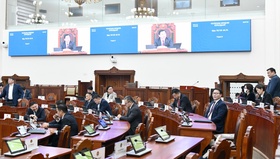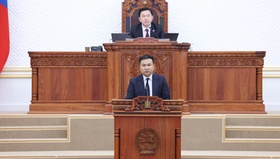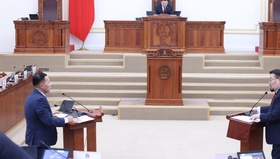PARLIAMENTARY ETHICS:
INTERNATIONAL PRACTICE AND MONGOLIA’S CASE
INTERNATIONAL PRACTICE AND MONGOLIA’S CASE
Chairman,
Esteemed guests and fellow Parliamentarians,
Once again, it is my distinct pleasure to welcome you all to Mongolia …
The main topic of this session is ethics and oversight. I am convinced that these are important issues which we simply cannot avoid in our discussion on fight against corruption. Here, I am going to concentrate more on Parliamentary ethics. First, I would like to elaborate on the importance of international exchanges and cooperation in this field. Second, I will briefly share our story here in the State Great Hural of Mongolia.
Ethics is a very broad topic. It is an old issue as well. It is as old as the origin of first parliaments, I believe. Ethics also always has been a very fundamental issue.
Parliamentarians, who fail to submit to expected ethical standards, cannot produce sound policies and legislations that serve for the best interest of their nation and people. Vise versa, in societies that lack moral and ethical good, the principle of rule of law can hardly find fertile soil for survival. No amount of laws can prevent cheating in the absence of ethics.
Ethics of politicians is fundamental in further perfecting democracy. It is also equally important in maintaining and raising public trust in democratic political institutions. And it is essential in fight against corruption - long lasting social and political struggle of each and every nation represented here.
Despite the universal awareness and acknowledgement of the fundamental importance of ethics, the issue of parliamentarians’ ethics is still problematic in many countries.
However, the good news is that parliaments around the world are becoming more active in addressing ethical misconducts of their members and refining their ethical system to prevent further misconducts and raise the public trust in the parliament. Today, in our Parliamentary Forum, we have representatives from 10 different national parliaments. I believe we all have good practices and important lessons to share with each other. For example, we have learned that the Sejm of Poland established Deputies' Ethics Committee in 1998. Lower House of the Indonesian Parliament adopted a code of ethics in 2004. And last year, Parliament of Kyrgyzstan approved of the Committee for procedural rules of Parliament and parliamentary ethics within its structural change.
Moreover, it is worth applauding that international network of parliamentarians aimed at consolidating democracy and combating corruption, such as PFD and GOPAC have been emerging to serve as international bodies to provide coherent and integrated approach and to recommend benchmarks of norms and standards for democratic parliaments.
Since its establishment in 2002, GOPAC brought together over 170 parliamentarians and 400 observers dedicated to fighting corruption and improving good governance. GOPAC’s vision is to achieve accountability and transparency through effective anti-corruption mechanisms and inclusive participation and cooperation between parliamentarians, government and civil society. It has a special task force on Parliamentary ethics and conduct. In 2009, this Global Task Force has released A Handbook on Ethics, which provides a fine tool for parliamentarians to develop and strengthen ethics regimes in their own parliaments as well as to promote best practice in this area. We are glad to have two colleagues from GOPAC with us today, MP Budiman Sudjatmiko from Indonesia and MP Mairamkul Tilenchieva from Kyrgyzstan.
Not only national parliaments, but also supranational organizations like United Nations and European Union have accomplished great deal in setting government ethical standards and imposing them to their member states. At the same time, international organizations like Transparency International and newly established International Anti Corruption Academy possess a great deal potential in promoting improvement of ethical system globally. Presence of leaders of these organizations today makes our Forum even more meaningful. I believe it is a good opportunity for us to explore the further effective ways and means to develop cooperation with these organizations.
In my view, international cooperation on Parliamentary Ethics and Conducts is crucial at least in three ways. First, it provides good opportunities of knowledge sharing. Second, it provides us tools and resources to build better capacity. Third, it also works as pressure for change.
Although a young democracy, Mongolia has been on a path similar to those of our friends, regarding the establishment of ethical oversight body, and its roles and functions.
In 1997, “Law on the State Great Hural of Mongolia” first stated that the State Structure Standing Committee shall have a Subcommittee on Ethics. Its mandate covered Ethics of Members, Declaration of Members’ Income, and dissemination and enforcement of rules of procedure of the State Great Hural. The first Committee was established in 2000. However, it took 10 more years until the “Code of Ethics for Member of the State Great Hural” and the “The Rules of Procedure of the Subcommittee” were approved by the Parliament and State Structure Standing Committee, in 2009 and in 2010 respectively. The committee had only 3 meetings within 12 years.
A new parliament has assembled after the parliamentary election held last year. And currently, the Subcommittee on Ethics comprises of 8 members. In February 2013, the Rules of Procedure was amended, broadening its mandate to initiate investigative action by the committee’s own initiative. The new rules also has clarified the roles and functions of the subcommittee and its members, and more importantly, gave a strong emphasis on providing necessary information and advice to the members of parliament in order to prevent ethical misconducts.
Here I would like to mention how one particular case, which drew much attention internally as well as internationally, was handled by the newly formed Ethics Subcommittee. It was a case where the Vice Chairman of the State Great Hural failed to include his offshore bank account in his yearly Statement of Income and Interest. Just this Tuesday, the subcommittee convened on this issue, and made a decision to submit it to the Session of the Parliament, deliberated on by all 76 MPs. At the end of the session, the MP in question, by his own initiative, stepped down from his position as the Vice Chairman of the State Great Hural.
The new Rules of Procedure provides us with the framework to bring Code of Conduct into life. However, we must also remember that codes are works in progress. They are not fixed and must evolve as we learn from our practical life and best practices from other countries.
Moreover, we need to build capacity. Mere existence of ethical system is not enough for preventing misconducts by parliamentarians.
The existence of a code of ethics and committee can help, but it does not guarantee a miracle cure for all that is perceived to be wrong with politics. Codes of conduct are most effective when they are built on a political culture where integrity, transparency and accountability are highly valued.
A good check and balance system is needed, in order to ensure legitimacy of political institutions and to facilitate transparency, while abuse of power and corruption are minimized.
Cultural attitude is another factor that we need take into consideration. For example, Mongolians lived under communist rule until 1990. People are yet to shed their mindset of expecting everything to be spoon-fed from the state. Over 80 percent of petitions addressed to the Parliament are requests for assistance for tuitions and gers, meaning Mongolian traditional dwelling. Is it an ethical act to satisfy requests of few using taxpayers’ money? Everyone has their own answer to that question, but it is safe to say that most people still believe it is unethical for MPs to leave such personal requests of their constituents unsatisfied.
As we have witnessed, much work deserving of credit has been accomplished by parliamentarians around the world. However, much more is required to raise and keep our conduct and behavior to finer levels. I hope that this forum will provide us with fresh and constructive ideas to accomplish this mission.
I thank you for your attention.

 Мон
Мон  English
English

